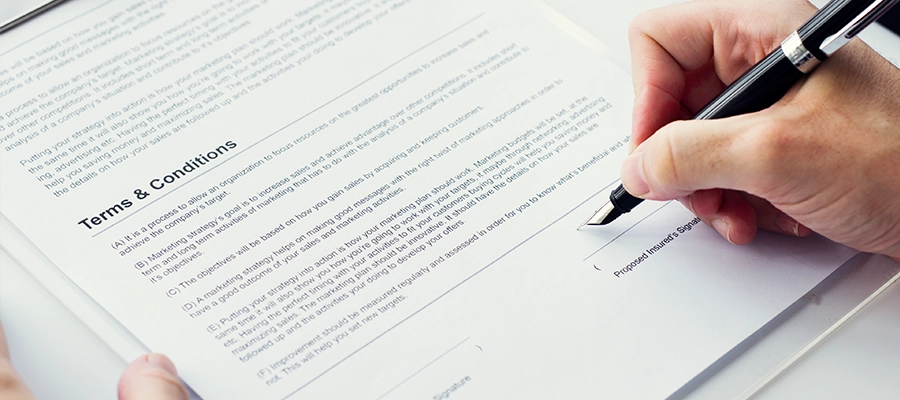Blog Content Overview
While SaaS has simplified enterprise software in multiple ways, however, subscribing to an “enterprise-class” system still requires a fairly complex contract negotiation process. Here is a SaaS contract negotiation checklist that covers the top ten crucial factors to consider when negotiating your SaaS Agreement:
1. Commercials
Usually discussed by the sales and/or the business teams and are negotiated before commencing the legal negotiation process. Pricing, payment terms, taxes, and billing methods should be negotiated with the sales or business teams before legal negotiation.
2. Liability Cap
The liability cap is the most important clause for protecting parties in claims as it sets a limit on the liability brought. Usually incorporated in an agreement to safeguard a party from any potential liability that may arise and to safeguard from any unlimited liabilities.
3. Intellectual Property (IP) Rights
While negotiating SaaS agreement, IP rights are of integral importance. The IP clause determines who owns IP rights and ensures that the agreement covers areas such as indemnity if a third-party claims IP infringement.
4. Effect of Termination
It’s important to stipulate what happens to data after termination of the agreement and for how long the customer has access to the platform, data backup frequency, and procedures.
5. Term
If a vendor offers pricing discounts, subscription metrics and additional fees, in such cases extended contract terms may be required. Vendors prefer longer terms because it provides more predictability in their revenue forecasting. Terms can range from 30 days to five years.
6. Indemnities
Clarify when indemnification is required and if limitations of liability apply to an indemnification claim. Ensure the contract provides indemnification for data as well as for security breaches and IP infringement.
7. Service Level Agreements (SLAs)
The SLA is the vendor’s commitment to keeping the system up and running and is typically expressed as a percentage of “up time”. You will almost always see the SLA represented as 95 to 99.9% or thereabouts. However, there is a wide variation in how the vendor calculates system uptime. A breach of the up time can result in grant of service credits, or a proportionate extension of the subscription period.
8. Data Protection Provisions
Include a differentiation between processor and controller and respective obligations in the agreement and ensure that it is GDPR-compliant.
9. Data Export
Two key things for consideration:
(a) you must ensure that data ownership is retained; and
(b) that you know how to export data in case of migrating to another system or the vendor going out of business and you need access to your data even before you select a new system.
10. Warranties
Generally, cloud service contracts contain many of the following warranties:
(1) that the service will materially conform to the documentation,
(2) the services will be performed in a workmanlike and professional manner,
(3) the provider will provide the necessary training for the customer to use the services
(4) the provider has sufficient authority to enter into this agreement
Other important considerations include disclaimers of warranties, force majeure, survival clause, and confidentiality provisions. Always ensure the customer fully understands that the services provided always carry inherent risks.
By prioritizing these ten factors in your SaaS contract negotiation checklist, you can create a solid SaaS agreement that aligns with your business’ needs, protects your interests, and ensures a successful and stress-free implementation.
FAQs on Points of Negotiation for SaaS Agreements
Q: How to negotiate the price for SaaS?
A: When negotiating the price for SaaS, it’s important to understand the service you’ll be receiving and what it’s worth to your business. You can request a detailed breakdown of the pricing structure and compare it with other vendors on the market. Be prepared to discuss payment terms and negotiate for discounts or bundling options when possible.
Q: How do you politely negotiate a contract?
A: When negotiating a contract, it’s important to approach the process with an open and collaborative mindset. Be clear about your needs and priorities, but also take the time to understand the vendor’s perspective. Listen carefully and ask questions when necessary, and seek common ground where possible. Ultimately, aim for a mutually beneficial agreement that meets both parties needs.
Q: What are the key points in a SaaS agreement?
A: The key points in a SaaS agreement include commercial terms, liability cap, intellectual property rights, effect of termination, terms, indemnities, service level agreements, data protection provisions, data export provisions and warranties. These areas cover crucial aspects such as pricing, data protection, and vendor responsibilities, and should be negotiated and agreed upon before signing the contract.
Q: What are the payment terms for SaaS contracts?
A: Payment terms for SaaS contracts can vary depending on the vendor and specific agreement. Some vendors may require payment upfront or on a monthly or annual basis. Others may offer more flexible payment schedules or subscription models. It’s important to review and negotiate payment terms to ensure they align with your business’ budget and cash flow needs.
We Are Problem Solvers. And Take Accountability.
Related Posts


Compliance Calendar – July 2025 (Checklist & Deadlines)
Sync with Google CalendarSync with Apple Calendar As we enter the second half of 2025, staying compliant with various financial,...
Learn More

Conversion of Partnership Firm to LLP – Step by Step Process
For many entrepreneurs in India, a partnership firm serves as the foundational legal structure for their business ventures. However, as...
Learn More

Memorandum of Association – MoA Clauses, Format & Types
The Memorandum of Association (MOA) is one of the most essential documents in the company incorporation process, forming the foundation...
Learn More











